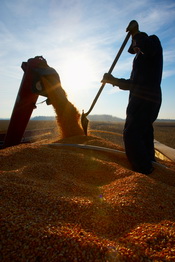Chinese Scientists' Genome-Edited Wheat to Help Control Weeds |
 A close relative of wheat, jointed goatgrass (Aegilops tauschii) has been worsening the problems of Chinese farmers. Mesosulfuron is the only wheat-registered foliar-applied herbicide that provides control of jointed goatgrass in China, but using it damages wheat crops. Non-transgenic wheat varieties tolerant to imidazolinone (IMI) herbicides can help solve these problems, but IMI herbicides remain in the soil and severely damage sensitive crops planted months and even years later. A close relative of wheat, jointed goatgrass (Aegilops tauschii) has been worsening the problems of Chinese farmers. Mesosulfuron is the only wheat-registered foliar-applied herbicide that provides control of jointed goatgrass in China, but using it damages wheat crops. Non-transgenic wheat varieties tolerant to imidazolinone (IMI) herbicides can help solve these problems, but IMI herbicides remain in the soil and severely damage sensitive crops planted months and even years later.
|
|
|
|
|
|
|
China's GM Approval Process Could Cost Farmers Billions |
 The approval process of China for GM crops is affected by regulatory hurdles and delays that led to additional costs for US companies as well as added concern for farmers. According to researchers, some GM products have been waiting for approval for over six years, without any scientific basis for these prolonged delays. Thus, industry groups and some US policymakers have been proactive in pushing the Trump administration to press China to make more transparent and timely regulations for approval of GM crops. The approval process of China for GM crops is affected by regulatory hurdles and delays that led to additional costs for US companies as well as added concern for farmers. According to researchers, some GM products have been waiting for approval for over six years, without any scientific basis for these prolonged delays. Thus, industry groups and some US policymakers have been proactive in pushing the Trump administration to press China to make more transparent and timely regulations for approval of GM crops.
|
|
|
|
|
|
|
|
|

|
A biweekly update on gene editing research, regulations, and impact
produced by ISAAA Inc. |
| |
|
|

|
| A monthly update on gene drive research and development provided by ISAAA in collaboration with the Outreach Network for Gene Drive Research |
| |
|
|
|
|
GM APPROVAL UPDATES |
- The Philippines approved the canola event LBFLFK for food, feed, and processing.
- The Philippines approved the cotton event GFM cry1A for commercial cultivation.
- Brazil approved the wheat event HB4 for commercial cultivation.
- The Philippines approved the soybean event GMB 151 for food, feed, and processing.
- The Philippines approved the eggplant event EE-1 for cultivation
- The USA approved the canola event MON94100 for food and feed.
|
|
|
|
| Biotech Updates is a weekly newsletter of ISAAA, a not-for-profit organization. It is distributed for free to over 22,000 subscribers worldwide to inform them about the key developments in biosciences, especially in biotechnology. Your support will help us in our mission to feed the world with knowledge. You can help by donating as little as $10. |
|
|
|
|